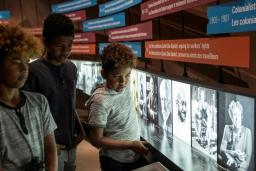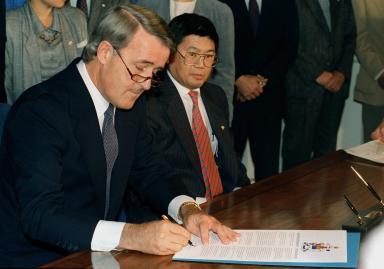Join us this Sunday, December 10 as we celebrate Human Rights Day with FREE admission for everyone and special programs and activities happening throughout the day.
Human Rights Day 2023
Celebrate with free admission and in‐gallery programming all day.
Sunday, December 10, 10:00 a.m. to 5 p.m.
This event has passed.
Tags:
.jpg?itok=BtcvKPLc)
Photo: CMHR, Ian McCausland
Event details
- Cost:
- Free

Celebrate 75 years
On December 10, 1948, the United Nations General Assembly adopted the Universal Declaration of Human Rights (UDHR).
The UDHR contains 30 aspirational articles which recognize the inherent dignity and equality of every human being.
We encourage you to take a moment today to learn about the rights, through the illustrated version of the Universal Declaration of Human Rights, that each and every one of us deserve.
Honouring a human rights defender
On Human Rights Day, the CMHR is partnering with the Consulate General of Japan in Calgary and the Japanese Cultural Association of Manitoba (JCAM) to pay tribute to the life and work of human rights defender Arthur Miki.
This invitation‐only program will focus on Art Miki’s life and career and will include a book signing for his recently released memoir, Gaman – Perseverance.
You can purchase your copy of Gaman – Perseverance in the Museum Boutique.
Arthur Miki
Arthur Miki is a distinguished educator and community activist.
Art was born in British Columbia in 1936, where he lived with his family on a fruit farm just outside of Vancouver. During the Second World War, Canada forcibly removed Japanese Canadians from their homes and expropriated their businesses. Art and his family relocated to St. Agathe, Manitoba.
As President of the National Association of Japanese Canadians (NAJC) in the 1980s, he led negotiations for the apology and redress settlement for Japanese Canadians interned during the Second World War.
In 1988, the government reached a settlement agreement with the NAJC which included the establishment of the Canadian Race Relations Foundation, created to ensure this type of discrimination would never happen again.
Then Prime Minister Brian Mulroney formally apologized to Japanese Canadian survivors and their families on September 22, 1988.
Over the years, Art has been an activist and leader, an educator and innovative school principal, a citizenship judge, a university lecturer, an author, and a champion for human rights for all Canadians.
He has extended support and guidance to Indigenous and Chinese Canadian communities, sharing his knowledge and experience to aid their efforts for truth and reconciliation concerning human rights violations against them.
Art Miki is featured in the Canadian Journeys gallery in the niche Under Suspicion: Japanese Canadians and Wartime Rights.
Art continues to live in Winnipeg where he still actively fights and raises awareness about different human rights issues.
